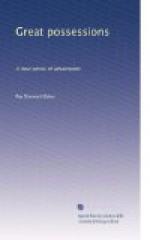And as a people deficient in musical art delights in ragtime tunes, so a people deficient in the true art of tasting and smelling delights in ragtime odours and ragtime tastes.
I do not know that the three so-called lesser senses will ever be organized to the point where they are served by well-established arts, but this I do know—that there are three great ways of entering upon a better understanding of this magic earth which are now neglected.
I think we have come upon hasty and heated days, and are too much mastered by the god of hurry and the swift and greedy eye. We accept flashing pictures of life for life itself; we rush here and rush there and, having arrived, rush away again—to what sensible purpose? Be still a little! Be still!
I do not mean by stillness, stagnation not yet lazy contentment, but life more deeply thought about, more intensely realized, an activity so concentrated that it is quiet. Be still then!
So it is that, though I am no worshipper of the old, I think the older gardeners had in some ways a better practice of the art than we have, for they planted not for the eye alone but for the nose and the sense of taste and even, in growing such plants as the lamb’s tongue, to gratify, curiously, the sense of touch. They loved the scented herbs, and appropriately called them simples. Some of these old simples I am greatly fond of, and like to snip a leaf as I go by to smell or taste; but many of them, I here confess, have for me a rank and culinary odour—as sage and thyme and the bold scarlet monarda, sometimes called bergamot.
But if their actual fragrance is not always pleasing, and their uses are now grown obscure, I love well the names of many of them—whether from ancient association or because the words themselves fall pleasantly upon the ear, as, for example, sweet marjoram and dill, anise and summer savoury, lavender and sweet basil. Coriander! Caraway! Cumin! And “there’s rosemary, that’s for remembrance; pray you, love, remember,... there’s fennel for you, and columbines: there’s rue for you: and here’s some for me—” All sweet names that one loves to roll under his tongue.
I have not any great number of these herbs in my own garden, but, when I go among those I do have, I like to call them by their familiar names as I would a dignified doctor or professor, if ever I knew him well enough.




